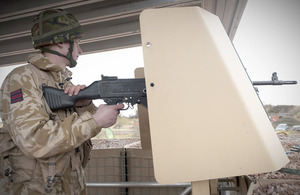More efficient bases for establishing stability in Afghanistan showcased
New ways of making forward operating bases used by British troops in Afghanistan easier to construct and more energy efficient were displayed yesterday.

A soldier manning a defensive position at the FOBEX event [Picture: Andrew Linnett, Crown Copyright/MOD 2011]
Units deployed in Helmand work out of tactical bases or forward operating bases in remote locations. The bases require supporting infrastructure and capabilities. At the moment there is a multitude of designs, and configurations have evolved during operations dependent on the types of missions conducted from each base.
The MOD’s Programmes and Technology Group has been collaborating with industry to develop an open architecture and create a scalable, modular approach to tactical base equipment and infrastructure.
The generic base architecture project aims to develop the thinking of the tactical base as a system, rather than a collection of constituent parts, that will enable them to be easily adapted when the need arises, cutting the work in theatre, and reducing the operational burden.
Some of the possible new designs were displayed at the FOBEX event yesterday at Caerwent Training Area, near Newport, South Wales.
Captain Christian Hulme, of the Royal Engineers, speaking at the event, said:
Building a forward operating base [FOB] can take anywhere between a fortnight and up to five or six weeks. When you are building it, you have to do so as quickly as possible.
It can be quite a demanding operation because you have to make do with what you have - and sometimes certain components will not be compatible with one another.
A FOB is essentially a home to armed forces personnel so you want to make sure it is as comfortable and accommodating as possible.
The idea of FOBEX is looking at ways we can be more efficient. Having lighter and more portable kit, which is quicker to assemble and creates more of a standard base, will not only use less energy but save lives.
Ministry of Defence energy project manager, Ray Fielding, said the ultimate aim of FOBEX was to drive up standards in the military:
Today is part of a wider aim to have more joined-up thinking - as well as forging relationships with larger and smaller companies.
Some ideas, such as hybrid generators, could be extremely beneficial and even applied to boats.
There is also a company which has developed inflatable solar panels as well as repairable ones. The latter are incredibly useful because each solar panel can cost around £700 to replace.